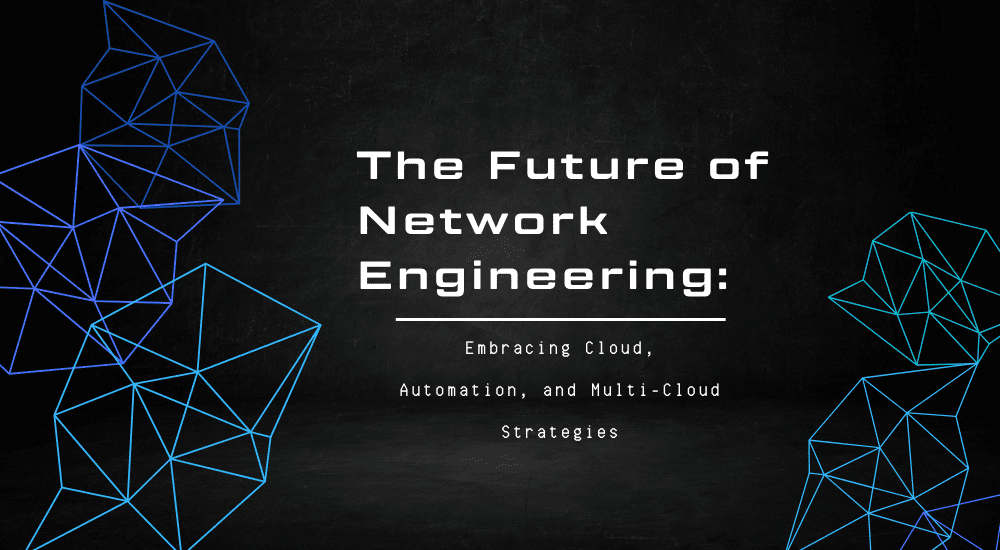The Future of Network Engineering: Embracing Cloud, Automation, and Multi-Cloud Strategies

Table of Contents
Introduction
In the realm of modern IT systems, network engineering plays a pivotal role. This article provides an insightful overview of the current state of the industry and sheds light on the future prospects for network engineers.
Future Prospects and Demand
As digitalization and emerging technologies continue to reshape industries, the demand for skilled network engineers is on the rise. The job scope is shifting towards cloud engineering and multi-cloud management, highlighting the need for expertise in cloud platforms.
Changing Job Requirements
Network engineers must now possess a comprehensive skillset encompassing infrastructure, cloud platforms, and automation. Programming skills have become vital for cloud configuration and management, alongside enhanced project management and team leadership capabilities.
Future-Proofing Skills
To future-proof their careers, network engineers should focus on acquiring a broad skillset in infrastructure areas, developing proficiency in programming languages like Python and Ruby, and honing project management and team leadership skills.
Impact of Cloud Computing
The advent of cloud computing has catalyzed a shift from traditional networking to virtual networks in cloud environments. Network engineers with cloud platform knowledge, such as AWS, Azure, and Google Cloud, are in high demand. Automation, security, and multi-cloud optimization skills are crucial in this evolving landscape.
Conclusion
Network engineering is evolving rapidly, necessitating professionals to adapt and acquire new skills continually. The future of network engineering is intertwined with the advancements in cloud technologies, underscoring the importance of staying abreast of industry trends.
Keywords: itil jobs, entry level network engineer, junior network engineer, network operations vs network engineering, network engineer remote jobs, future for network engineers
References: Network Engineer Certification
Remote Work Platform
Features:
- Nationwide coverage
- Free job posting
- Multiple candidate submissions
- Escrow transactions
- Job categories: Design, Operations, Marketing, Development, Product, Other
- Skills: Network security, System security, IT technical support, DBA, Operations engineer, Operations development engineer, Network engineer, System administrator, IDC, Web security, CDN, Virus analysis, Server operations, Linux
- Work duration: No limit, 1-3 months, 3-6 months, 6 months or more
- Sorting options: Comprehensive, Latest posted
Network Engineer Remote Work Jobs
Job Listings:
- 11 listings available
Salary Range: 300,000 - 1,050,000 yen per year
Features:
- Remote work options
- Full remote work available
- Cisco, AWS, and other technical skills required
- Flexible work arrangements
- Low overtime hours (typically under 20 hours per month)
- Career advancement opportunities
- Employee benefits such as paid time off, health insurance, and training programs
-
Question: What are the key trends shaping the future of network engineering?
Answer: The future of network engineering is being shaped by the adoption of cloud technologies, automation, and the implementation of multi-cloud strategies. -
Question: How can network engineers embrace cloud technologies in their work?
Answer: Network engineers can embrace cloud technologies by learning cloud networking principles, skills, and certifications such as AWS Certified Solutions Architect or Azure Networking Associate. -
Question: Why is automation important in network engineering?
Answer: Automation is crucial in network engineering to streamline repetitive tasks, reduce human errors, and improve operational efficiency. -
Question: What are the benefits of implementing multi-cloud strategies?
Answer: Implementing multi-cloud strategies enables organizations to increase redundancy, optimize costs, and leverage the unique features offered by different cloud providers. -
Question: How can network engineers prepare for the future of network engineering?
Answer: Network engineers can prepare for the future by upskilling in cloud technologies, automation tools, and staying updated on industry trends through continuous learning. -
Question: What role does software-defined networking (SDN) play in the future of network engineering?
Answer: SDN plays a crucial role in the future of network engineering by enabling centralized control, programmability, and agility in network management. -
Question: How can network engineers adapt to the increasing complexity of modern networks?
Answer: Network engineers can adapt by developing strong troubleshooting skills, understanding network security best practices, and leveraging advanced monitoring and management tools. -
Question: What challenges do network engineers face when implementing cloud and multi-cloud environments?
Answer: Challenges include ensuring security and compliance, managing network performance across different cloud platforms, and integrating hybrid cloud architectures seamlessly. -
Question: What are the key skills required for network engineers in the era of cloud and automation?
Answer: Key skills include cloud networking expertise, programming knowledge (Python, Ansible), familiarity with virtualization technologies, and a strong foundation in network fundamentals. -
Question: How can network engineers stay ahead of the curve in the rapidly evolving field of network engineering?
Answer: Network engineers can stay ahead by networking with peers, attending industry conferences, obtaining relevant certifications, and participating in online training courses to continuously enhance their skills.